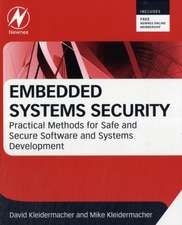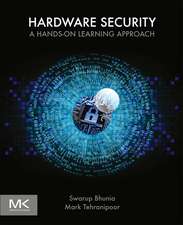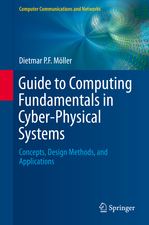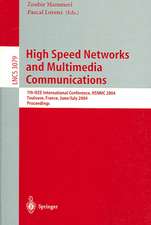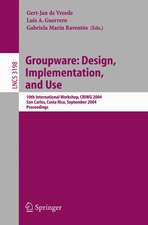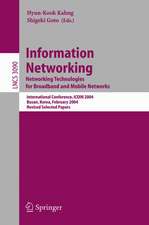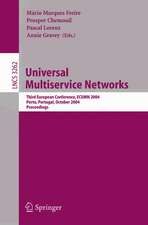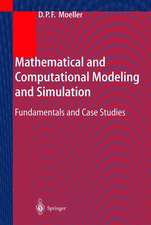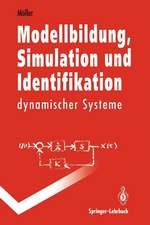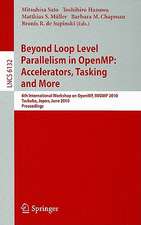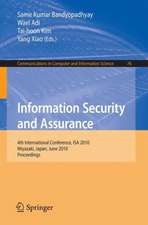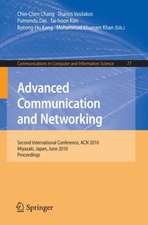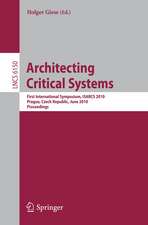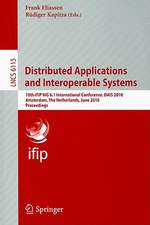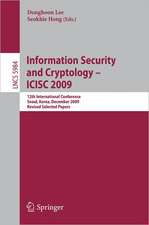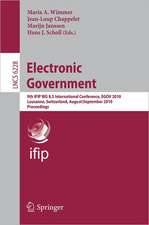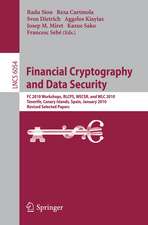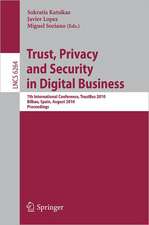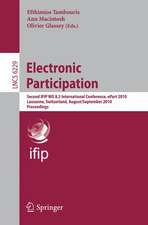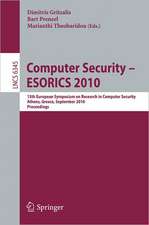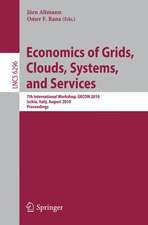Guide to Automotive Connectivity and Cybersecurity: Trends, Technologies, Innovations and Applications: Computer Communications and Networks
Autor Dietmar P. F. Möller, Roland E. Haasen Limba Engleză Hardback – 12 apr 2019
Topics and features: discusses the automotive market, automotive research and development, and automotive electrical/electronic and software technology; examines connected cars and autonomous vehicles, and methodological approaches to cybersecurity to avoid cyber-attacks against vehicles; provides an overview on the automotive industry that introduces the trends driving the automotive industry towards smart mobility and autonomous driving; reviews automotive research and development, offering background on the complexity involved in developing new vehicle models; describes the technologies essential for the evolution of connected cars, such as cyber-physical systems and the Internet of Things; presents case studies on Car2Go and car sharing, car hailing and ridesharing, connected parking, and advanced driver assistance systems; includes review questions and exercises at the end of each chapter. The insights offered by this practical guide will be of great value to graduate students, academic researchers and professionals in industry seeking to learn about the advanced methodologies in automotive connectivity and cybersecurity.
Din seria Computer Communications and Networks
- 20%
 Preț: 378.19 lei
Preț: 378.19 lei - 20%
 Preț: 684.74 lei
Preț: 684.74 lei - 20%
 Preț: 218.22 lei
Preț: 218.22 lei - 20%
 Preț: 1013.39 lei
Preț: 1013.39 lei - 20%
 Preț: 368.78 lei
Preț: 368.78 lei - 20%
 Preț: 505.49 lei
Preț: 505.49 lei - 20%
 Preț: 646.80 lei
Preț: 646.80 lei - 20%
 Preț: 765.60 lei
Preț: 765.60 lei - 20%
 Preț: 339.47 lei
Preț: 339.47 lei - 20%
 Preț: 597.29 lei
Preț: 597.29 lei - 20%
 Preț: 655.85 lei
Preț: 655.85 lei - 20%
 Preț: 997.06 lei
Preț: 997.06 lei - 20%
 Preț: 351.89 lei
Preț: 351.89 lei - 20%
 Preț: 902.04 lei
Preț: 902.04 lei - 20%
 Preț: 996.22 lei
Preț: 996.22 lei - 20%
 Preț: 644.81 lei
Preț: 644.81 lei - 15%
 Preț: 650.69 lei
Preț: 650.69 lei - 20%
 Preț: 650.73 lei
Preț: 650.73 lei - 20%
 Preț: 373.91 lei
Preț: 373.91 lei - 20%
 Preț: 646.95 lei
Preț: 646.95 lei - 20%
 Preț: 1004.99 lei
Preț: 1004.99 lei - 20%
 Preț: 646.80 lei
Preț: 646.80 lei - 20%
 Preț: 341.81 lei
Preț: 341.81 lei - 20%
 Preț: 656.19 lei
Preț: 656.19 lei - 20%
 Preț: 651.75 lei
Preț: 651.75 lei - 20%
 Preț: 331.08 lei
Preț: 331.08 lei - 20%
 Preț: 650.40 lei
Preț: 650.40 lei - 20%
 Preț: 988.66 lei
Preț: 988.66 lei - 20%
 Preț: 643.97 lei
Preț: 643.97 lei - 20%
 Preț: 761.44 lei
Preț: 761.44 lei - 20%
 Preț: 332.71 lei
Preț: 332.71 lei - 20%
 Preț: 345.59 lei
Preț: 345.59 lei - 20%
 Preț: 332.06 lei
Preț: 332.06 lei - 20%
 Preț: 996.22 lei
Preț: 996.22 lei - 20%
 Preț: 644.15 lei
Preț: 644.15 lei - 20%
 Preț: 326.64 lei
Preț: 326.64 lei - 20%
 Preț: 320.19 lei
Preț: 320.19 lei - 20%
 Preț: 1013.06 lei
Preț: 1013.06 lei - 20%
 Preț: 642.52 lei
Preț: 642.52 lei - 20%
 Preț: 641.01 lei
Preț: 641.01 lei - 20%
 Preț: 718.56 lei
Preț: 718.56 lei - 20%
 Preț: 1043.41 lei
Preț: 1043.41 lei
Preț: 609.09 lei
Preț vechi: 761.37 lei
-20% Nou
116.56€ • 121.25$ • 96.23£
Carte disponibilă
Livrare economică 24 martie-07 aprilie
Livrare express 08-14 martie pentru 57.73 lei
Specificații
ISBN-10: 331973511X
Pagini: 774
Ilustrații: XXV, 645 p. 210 illus., 81 illus. in color.
Dimensiuni: 155 x 235 x 42 mm
Greutate: 1.17 kg
Ediția:1st ed. 2019
Editura: Springer International Publishing
Colecția Springer
Seria Computer Communications and Networks
Locul publicării:Cham, Switzerland
Cuprins
Introduction
The Automotive Industry
Automotive Research and Development
Automotive E/E and Automotive Software Technology
The Connected Car
Automotive Cybersecurity
Mobile Apps for the Connected Car
Case Study A – Car2Go, Carsharing by Daimler
Case Study B – Car Hailing and Ridesharing
Case Study C – Connected Parking and Automated Value Parking
Case Study D – ADAS and Autonomous Driving
Summary, Outlook and Final Remarks
Recenzii
Notă biografică
Dietmar P. F. Möller is a Professor in the Institute of Applied Stochastics and Operations Research at Clausthal University of Technology (TUC), Germany; a Member of the Simulations Science Center (SWZ) Clausthal-Göttingen, Germany; an Adjunct Professor in the Department of Electrical and Computer Engineering at the University of Nebraska-Lincoln (UNL), USA; and an Adjunct Professor in the Department of Electrical and Computer Engineering at the University of Alabama in Huntsville (UAH), USA. He is also a member of the Board of the AMSC (Alabama Modeling and Simulation Council), USA. His other publications include the Springer titles Introduction to Transportation Analysis, Modeling and Simulation (2014) and Guide to Computing Fundamentals in Cyber-Physical Systems (2016). Roland E. Haas is the Founder and CEO of QSO-Technologies in Bangalore, India. He has more than 20 years of professional experience in senior techno-managerial, business innovation and business development assignments in Germany, USA, India and Japan with broad experience in automotive R&D, aerospace R&D, engineering & IT services, consulting and strategy. As an entrepreneur, he serves as a mentor for startups, a researcher and a book author. He is an honorary professor at the International Institute of Information Technology (IIIT-B) and an adjunct faculty member of the Indian Institute of Science (IISc). His teaching is in mechatronics, automotive electronics, car IT, automotive software technologies, information management and virtual product creation.
Textul de pe ultima copertă
This comprehensive text/reference presents an in-depth review of the state of the art of automotive connectivity and cybersecurity with regard to trends, technologies, innovations, and applications. The text describes the challenges of the global automotive market, clearly showing where the multitude of innovative activities fit within the overall effort of cutting-edge automotive innovations, and provides an ideal framework for understanding the complexity of automotive connectivity and cybersecurity.
Topics and features:
- Discusses the automotive market, automotive research and development, and automotive electrical/electronic and software technology
- Examines connected cars and autonomous vehicles, and methodological approaches to cybersecurity to avoid cyber-attacks against vehicles
- Provides an overview on the automotive industry that introduces the trends driving the automotive industry towards smart mobility and autonomous driving
- Reviews automotive research and development, offering background on the complexity involved in developing new vehicle models
- Describes the technologies essential for the evolution of connected cars, such as cyber-physical systems and the Internet of Things
- Presents case studies on Car2Go and car sharing, car hailing and ridesharing, connected parking, and advanced driver assistance systems
- Includes review questions and exercises at the end of each chapter
The insights offered by this practical guide will be of great value to graduate students, academic researchers and professionals in industry seeking to learn about the advanced methodologies in automotive connectivity and cybersecurity.
Caracteristici
Provides fundamental insights and describes innovative approaches, extended by use cases and exercises
Examines how Car IT and Automotive Cybersecurity will influence the development of autonomous cars
Descriere
This comprehensive text/reference presents an in-depth review of the state of the art of automotive connectivity and cybersecurity with regard to trends, technologies, innovations, and applications. The text describes the challenges of the global automotive market, clearly showing where the multitude of innovative activities fit within the overall effort of cutting-edge automotive innovations, and provides an ideal framework for understanding the complexity of automotive connectivity and cybersecurity.
Topics and features: discusses the automotive market, automotive research and development, and automotive electrical/electronic and software technology; examines connected cars and autonomous vehicles, and methodological approaches to cybersecurity to avoid cyber-attacks against vehicles; provides an overview on the automotive industry that introduces the trends driving the automotive industry towards smart mobility and autonomous driving; reviews automotive research and development, offering background on the complexity involved in developing new vehicle models; describes the technologies essential for the evolution of connected cars, such as cyber-physical systems and the Internet of Things; presents case studies on Car2Go and car sharing, car hailing and ridesharing, connected parking, and advanced driver assistance systems; includes review questions and exercises at the end of each chapter. The insights offered by this practical guide will be of great value to graduate students, academic researchers and professionals in industry seeking to learn about the advanced methodologies in automotive connectivity and cybersecurity.

